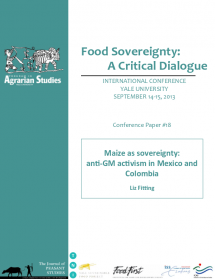Maize as sovereignty anti-GM activism in Mexico and Colombia
In this conference paper, I consider some of the strengths and weaknesses of the food sovereignty (FS) approach based on my research among anti-GM activists in Colombia and Mexico.

Authors
In this conference paper, I consider some of the strengths and weaknesses of the food sovereignty (FS) approach based on my research among anti-GM activists in Colombia and Mexico. Food sovereignty is taken up by anti-GM activists and rural producers in a way that is shaped by the particularities of place. Despite reproducing some of the problems of FS, I argue that these activists draw our attention to the specific issues and contexts of their region – particularly through their focus on maize-- and illustrate the usefulness of a food sovereignty approach. Their campaigns focus on maize as a symbol of sovereignty (at various scales) and campesino and indigenous ways of life, which activists believe are undermined by transgenic varieties of corn. In doing so, these campaigns situate the issue of GM corn imports, testing, and commercial cultivation within a broader critique of neoliberal globalization.
Liz Fitting Anthropologist and Associate Professor, Dalhousie University, Halifax, Canada.
Professor Fitting is the author of The Struggle for Maize: Campesinos, Workers, and Transgenic Corn in the Mexican Countryside (2011) and a forthcoming chapter in Food Activism: Agency, Democracy and Economy (2014), which compares anti-GM activism in Colombia and Mexico.
Food Sovereignty: a critical dialogue, 14 - 15 September, New Haven.